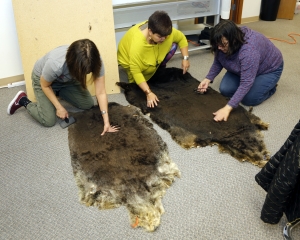SHI releases report on Indigenous sea otter stewardship in southeast Alaska
Study highlights cultural solutions, calls for expanded hunting, handicraft programs
Sept. 9, 2025
(Report)
Sealaska Heritage Institute (SHI) has released a new report on sea otter recovery and management in Southeast Alaska, documenting Indigenous knowledge, hunting practices and handicraft use alongside ecological research.
The study, “Sustainable Indigenous Harvest, Use, and Stewardship of the Sea Otter in Sitka Sound and Southeast Alaska,” was written by SHI Senior Research Fellow Dr. Thomas Thornton with support from the U.S. Fish and Wildlife Service. The report draws on interviews with hunters and artisans, archival sources and ecological data to examine how Alaska Native communities are responding to the rapid return of sea otters to their natural habitats.
The report notes that sea otters, reintroduced to Southeast in the 1960s and 1970s, are both a threat and an opportunity. They pose significant impacts on subsistence and commercial fisheries such as abalone, crab, clams and sea urchins. However, they also provide opportunities for Alaska Natives to expand traditions of sea otter hunting and handicrafting, protecting local shellfish beds and stimulating rural economies through pelts crafted for the retail market and for gift, trade and ceremonial use.
“Aboriginal sea otter hunting practices (prior to the commercial trade era) were well developed and managed, to the point of being able to limit sea otter impacts on local shellfish beds by applying strong hunting pressure to ‘keep them out,’” wrote SHI President Rosita Worl, Ph.D in a recent letter to Alaska’s congressional delegation. “SHI’s model of paying hunters for sea otter hides together with the training workshops in sea otter craft production can replicate this management system if adequately funded to expand the hunting and handicrafting opportunities to contain the sea otter population.”
The study highlights Sitka Sound as a case where increased hunting and handicraft production have helped ease pressure on shellfish resources near town, with shellfish beginning to return to subsistence harvest areas. However, harvests have since declined due to high up-front costs, tannery shortages and eligibility restrictions under federal rules. A major deterrent to increased hunting is the lack of local tanning facilities.
For years, Southeast Alaska had no fur tanneries, forcing hunters to ship hides to Anchorage, the Lower 48 or Canada, often waiting a year or more. The report notes that professional tanning can cost about $150 per pelt plus shipping, and recent closures of major out-of-state tanneries have left few options. These bottlenecks reduce incentives for hunters and create significant obstacles for artisans seeking to produce and sell sea otter handicrafts.
Report recommendations include:
– Improving communication among managers, tribes and user groups
– Conducting smaller-scale population surveys in partnership with communities
– Updating the federal conservation plan for sea otters
– Creating a regional working group with Natives and non-Natives
SHI policy recommendations include:
– Expanding funding for sea otter hunting and handicraft training programs
– Establishing new tanneries in Alaska through grants, loans and training
– Providing financial support to strengthen the tanning trade and reduce barriers for hunters
– Revisiting federal eligibility requirements under the Marine Mammal Protection Act
Sealaska Heritage Institute is a tribal organization founded in 1980 to perpetuate and enhance Tlingit, Haida and Tsimshian cultures of Southeast Alaska. SHI also conducts scientific and public policy research that promotes Alaska Native arts, cultures, history and education statewide. The institute is governed by a Board of Trustees and guided by a Council of Traditional Scholars, a Native Artist Committee, a Southeast Regional Language Committee and a newly formed Education Committee.
CONTACT: Therese Pokorney, SHI Communications Officer, therese.pokorney@sealaska.com
Caption: Students prepare sea otter hides during Louise Kadinger’s skin sewing workshop in Juneau. Note: Media outlets are permitted to use this image for coverage of this story. For a higher-res image, contact therese.pokorney@sealaska.com
